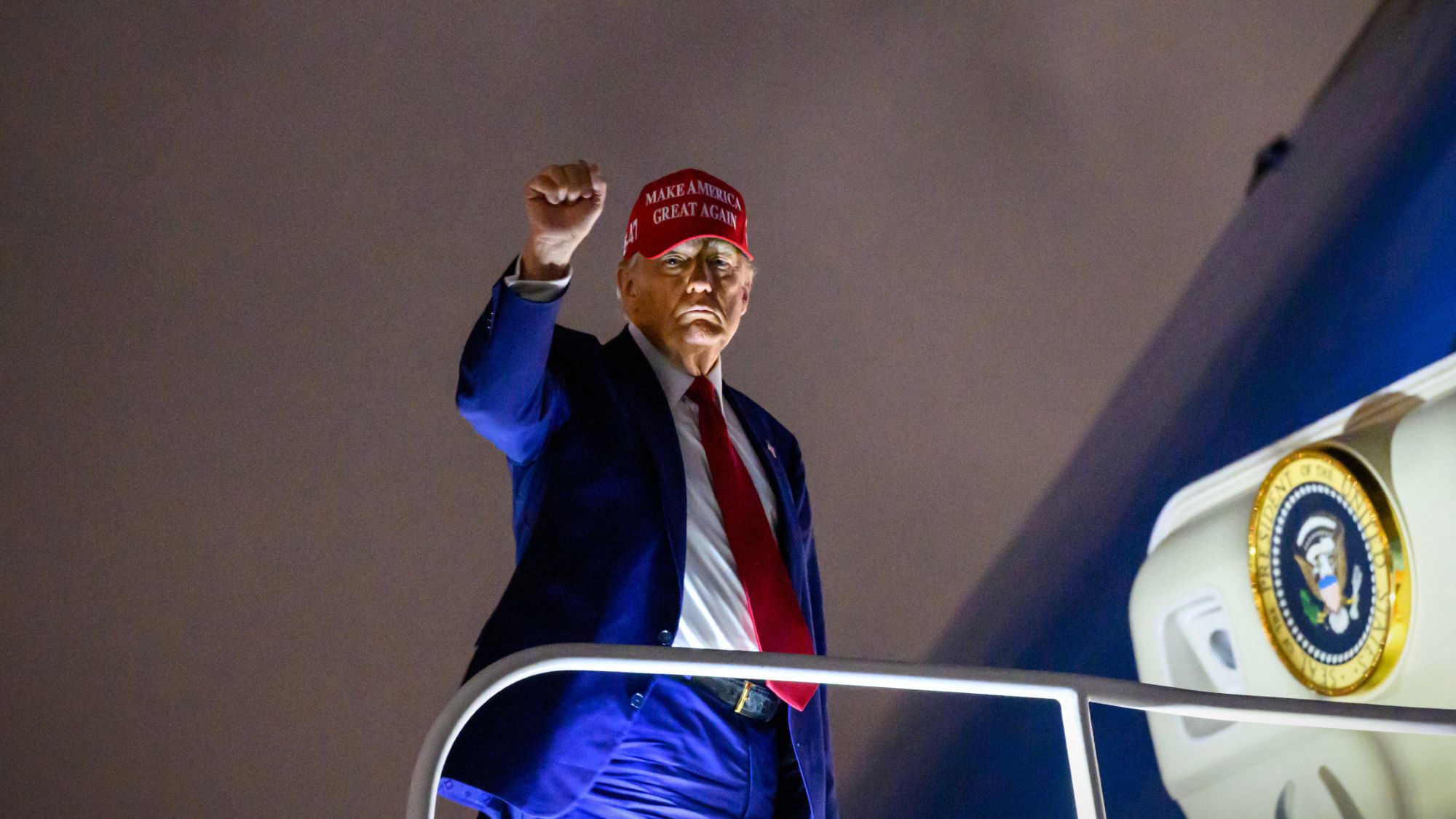Trump calls tariffs 'medicine' as stocks plunge
'Sometimes you have to take medicine to fix something,' the president said of his imposed 10% tariffs on imported goods


A free daily email with the biggest news stories of the day – and the best features from TheWeek.com
You are now subscribed
Your newsletter sign-up was successful
What happened
Markets in Europe and Asia dropped sharply Monday morning, extending last week's mass global selloff in reaction to President Donald Trump's imposition of 10% tariffs on most imported goods and vow to impose steeper "reciprocal" import taxes on specific countries. "I don't want anything to go down," Trump said Sunday, addressing the market plunge en route to Washington from a weekend of golf in Florida. "But sometimes you have to take medicine to fix something."
Who said what
Investors had "thought the loss of trillions of dollars in wealth and the likely body blow to the economy would make Trump reconsider his plans," Reuters said. Tens of thousands of "Hands Off" protesters also took to the streets in cities and towns across the U.S. on Saturday to protest Trump's tariffs, his and Elon Musk's dismantling of federal agencies and a host of other policies.
"Hang tough," Trump urged his followers in an all-caps social media post on Saturday. "This is an economic revolution, and we will win." Trump administration officials then "blitzed television networks" Sunday in a "full-court press" to defend Trump's "massive tariffs" as the administration came "under immense pressure to pull back," The Washington Post said. Even a "growing number of conservatives are pushing back against Trump's moves," including Musk.
The Week
Escape your echo chamber. Get the facts behind the news, plus analysis from multiple perspectives.

Sign up for The Week's Free Newsletters
From our morning news briefing to a weekly Good News Newsletter, get the best of The Week delivered directly to your inbox.
From our morning news briefing to a weekly Good News Newsletter, get the best of The Week delivered directly to your inbox.
What next?
It's not clear if the "real economy" will follow stock markets "off a cliff," but "the risks are tilting in that direction," The Wall Street Journal said. In a note titled "There Will Be Blood," JPMorgan economists raised the odds of a global recession to 60% from 40% and predicted unemployment will rise to 5.3% by next year, calling Trump's tariffs the largest U.S. tax increase since 1968. Trump said world leaders are calling him "dying to make a deal," but "there's no talk unless they pay us a lot of money on a yearly basis" and erase trade deficits.
A free daily email with the biggest news stories of the day – and the best features from TheWeek.com
Peter has worked as a news and culture writer and editor at The Week since the site's launch in 2008. He covers politics, world affairs, religion and cultural currents. His journalism career began as a copy editor at a financial newswire and has included editorial positions at The New York Times Magazine, Facts on File, and Oregon State University.
-
 Local elections 2026: where are they and who is expected to win?
Local elections 2026: where are they and who is expected to win?The Explainer Labour is braced for heavy losses and U-turn on postponing some council elections hasn’t helped the party’s prospects
-
 6 of the world’s most accessible destinations
6 of the world’s most accessible destinationsThe Week Recommends Experience all of Berlin, Singapore and Sydney
-
 How the FCC’s ‘equal time’ rule works
How the FCC’s ‘equal time’ rule worksIn the Spotlight The law is at the heart of the Colbert-CBS conflict
-
 Witkoff and Kushner tackle Ukraine, Iran in Geneva
Witkoff and Kushner tackle Ukraine, Iran in GenevaSpeed Read Steve Witkoff and Jared Kushner held negotiations aimed at securing a nuclear deal with Iran and an end to Russia’s war in Ukraine
-
 Pentagon spokesperson forced out as DHS’s resigns
Pentagon spokesperson forced out as DHS’s resignsSpeed Read Senior military adviser Col. David Butler was fired by Pete Hegseth and Homeland Security spokesperson Tricia McLaughlin is resigning
-
 Judge orders Washington slavery exhibit restored
Judge orders Washington slavery exhibit restoredSpeed Read The Trump administration took down displays about slavery at the President’s House Site in Philadelphia
-
 Kurt Olsen: Trump’s ‘Stop the Steal’ lawyer playing a major White House role
Kurt Olsen: Trump’s ‘Stop the Steal’ lawyer playing a major White House roleIn the Spotlight Olsen reportedly has access to significant US intelligence
-
 Hyatt chair joins growing list of Epstein files losers
Hyatt chair joins growing list of Epstein files losersSpeed Read Thomas Pritzker stepped down as executive chair of the Hyatt Hotels Corporation over his ties with Jeffrey Epstein and Ghislaine Maxwell
-
 Judge blocks Hegseth from punishing Kelly over video
Judge blocks Hegseth from punishing Kelly over videoSpeed Read Defense Secretary Pete Hegseth pushed for the senator to be demoted over a video in which he reminds military officials they should refuse illegal orders
-
 Trump’s EPA kills legal basis for federal climate policy
Trump’s EPA kills legal basis for federal climate policySpeed Read The government’s authority to regulate several planet-warming pollutants has been repealed
-
 House votes to end Trump’s Canada tariffs
House votes to end Trump’s Canada tariffsSpeed Read Six Republicans joined with Democrats to repeal the president’s tariffs
